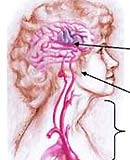Sudden blurred vision may be a sign of cerebral anemia
Suddenly seeing the eyes blurry may be a manifestation of transient ischemia - the warning of a stroke in the near future.

(Photo: SK & D)
Transient ischemic is a temporary impaired brain function in a short period of time (less than 24 hours) due to lack of blood to feed the brain region. This condition causes loss of function of the body area because the part of the brain is controlled by anemia.
The perpetrator causing anemia is often a blood clot that naturally forms in the cerebral vessels, or is created from another place and follows the flow of blood, clogging the brain artery. Cerebrovascular spasms, bleeding can also cause transient ischemia. Many people call this phenomenon 'small stroke.'
In some cases, the transient ischemic progression gradually, some progress very quickly. Stroke is often longer than the transient brain anemia, reflecting a very serious and permanent condition.
Although transient ischemia usually lasts only a few minutes and then will go away, neurologists recommend that this condition should be evaluated as an emergency stroke to try to stop prevent relapse. Transient ischemic attacks can occur one or more times, leading to a real stroke.
Symptoms of the disease
A transient ischemic attack of an eye artery may cause a brief loss of vision, and suddenly the patient feels that the eye is blurred. Cerebral anemia associated with carotid arteries causes loss of movement and a feeling on one side, the patient may be paralyzed by the arms, legs, face, or the entire side of the body. The patient may suddenly be unable to control the arm, not walk, look at one or two, the words distorted but still understand; dizziness, loss of feeling of balance . These manifestations occur only in a very short time, so it should be called 'transient'.
These symptoms reflect a problem that is localized in the brain, possibly due to brain artery stenosis or blood clots from the heart following blood flow to the brain. This condition also indicates an association with atherosclerosis and may reflect certain conditions such as diabetes, high blood cholesterol, and hypertension.
Management when brain ischemia
Transient ischemia causes abnormalities that occur very quickly. Therefore, when suddenly there are signs, the patient should be in a resting state (lying on a flat surface so that the blood reaches the brain most easily). Do not work hard or have strong emotions to prevent true stroke.
After that, patients need to be examined and tested for blood sugar, blood pressure, angiography, blood clotting test . to detect the cause of the disease and need to be treated immediately.
Do not arbitrarily use drugs such as anticoagulation, blood pressure reduction quickly . The patient needs to be examined carefully and only use the medication as directed by the doctor, because if you take the medication very likely make the disease worse.
Transient ischemia usually occurs in overweight people - obesity, high blood pressure, high blood cholesterol, hyperglycemia ., age over 50. In smokers, this situation occurs soon than.
Preventive measures must be started with a diet high in fiber, reduced fat, sugar, salt, and vitamins. Eat plenty of green vegetables, fresh fruits, limit the intake of stimulants such as alcohol and coffee. Absolutely not smoke cigarettes; This is the root cause of not only stroke but also other dangerous chronic diseases such as cancer, cardiovascular .
Exercising daily sports is also an important measure to greatly reduce the risk of disease. Some exercise methods are easy to apply for many people like walking, running small steps . Every week should practice at least 3 sessions, each session is at least 30 minutes. People who suffer from arthritis and arthritis will find it difficult to exercise on the ground, so the form of exercise most suitable for them is swimming.
Doctor Nguyen Hoang Nam
- The reasons why your eyes are blurred
- 9 abnormal signs of eye health problems
- What do eyes say about your health?
- Beware of cerebral vascular malformations!
- 40% of people with transient ischemic stroke
- Young anemia and identification signs
- 10 signs of low blood pressure
- New molecular discovery is beneficial for treating cerebral ischemia
- Some diseases in the common eye socket
- What should anemia eat to stay healthy?
- Guess the disease by location 6 pain everyone should know
- New hope for patients with Mediterranean anemia
 Green tea cleans teeth better than mouthwash?
Green tea cleans teeth better than mouthwash? Death kiss: This is why you should not let anyone kiss your baby's lips
Death kiss: This is why you should not let anyone kiss your baby's lips What is salmonellosis?
What is salmonellosis? Caution should be exercised when using aloe vera through eating and drinking
Caution should be exercised when using aloe vera through eating and drinking